|
 The
Launch Angle Swing is the term that is used -- too often perjortatively -- to describe the swings
of the best baseball and fast-pitch softball players. The
Launch Angle Swing is the term that is used -- too often perjortatively -- to describe the swings
of the best baseball and fast-pitch softball players.
The (supposed) alternative to the Launch Angle Swing is swinging down.
While some may be surprised to see baseball and fast-pitch softball
lumped together, I've studied both swings and have found that
the swings of the best baseball and fast-pitch softball
players are far more similar than they are different.

Comparison of the Swings of
Megan Bush And Evan Longoria
at the Point Of Contact
As a result, when teaching
Hitting, I use baseball and fast-pitch softball clips and
pictures
interchangeably.
The Launch Angle Swing
There a number of things it's important to understand about the Launch Angle Swing
and why it is (actually) high-level.
The Problem
Most of the limitations of the existing approaches to teaching
hitting stem from a lack of understanding of
what the High-Level Swing pattern looks like and how it works.
Actually.

Albert Pujols' Swing
Too often, people are just regurgitating the conventional
wisdom.
What everybody "knows."
Despite what video clips and pictures of the best hitters show.
As a result, most people don't know as much about
hitting and the High-Level Swing as they think they do.
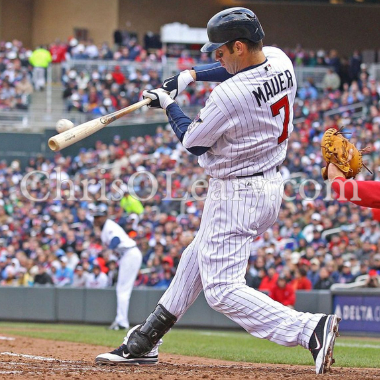
Joe Mauer's Swing
As I point out in my piece on the various
Myths About
Hitting, if you spend even the briefest amount of time
comparing what people teach, and what the best hitters actually
do, you will immediately see huge, and glaring, discrepencies.
It's the Same Swing
I've spent years going to games, filming hitters, accumulating a
library of clips of the best baseball and fast-pitch softball hitters,
and looking for commonalities.
What I've found is that most high-level baseball and fast pitch
softball players, and in particular hitters who hit for power,
exhibit the same basic movement patterns.

Albert Pujols' Home Run Swing
While there are significant physical
differences between Albert Pujols and Megan Bush, there are few,
if any, significant differences between their
swings.
That's because a high-level baseball swing and a high-level
fast pitch softball swing are the same basic swing.
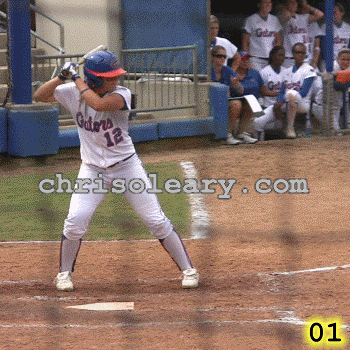
Megan Bush's Home Run Swing
For instance, notice how, while they load and get to Heel Plant
differently, once their front heels plant, their swings are basically
identical through the extension position.

Comparison of the Swings of
Albert Pujols and Megan Bush
You can see the same thing if you compare Megan Bush's swing to
my clip of Evan Logoria hitting a home run
to left field, especially at the Point Of Contact.

Comparison of the Swings of
Megan Bush And Evan Longoria
The baseball swing and the fast pitch softball swing are the
same for a very simple reason; while men and women typically have
significantly different levels of upper body strength, all able-bodied
people, regardless of their sex, have roughly proportional levels of
core strength (because it's the key to walking and running).
Because the High-Level Swing lets you tap into the large muscles
of the core, it is very efficient and as a result tends to be
the predominant swing pattern at the highest levels of both
baseball and fast pitch softball.
Key Concepts
In order to understand the High-Level Swing, you have to
understand the concepts that serve as its foundation.
These concepts, which were first defined by Paul Nyman, include...
...and are followed by more advanced concepts like...
In order to swing with their entire body, and not just their
arms, a hitter must start from an athletic position.
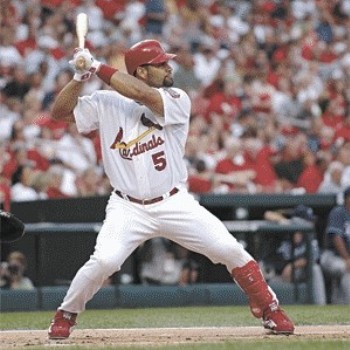
Albert Pujols at Setup
It is almost impossible to swing with your entire body, and
not just your arms, if you are standing overly erect with your
feet too close together and your knees locked.
A good swing is powered by the rotation of the hips and
shoulders — driven by the large muscles of the core —
and not by a linear, pushing movement of the small muscles of the
arms, wrists, and hands.

Albert Pujols Demonstrating Rotation
While the arms, wrists, and hands are
important to the swing, their job is to help funnel, direct, and
manage the force that is generated by the body rather than
to create force.

Albert Pujols Demonstrating Rotation
The photo above of Albert Pujols is a great example of what
good Rotation looks like. Notice how his hips have stopped moving
forward and have rotated 90 degrees, due in part to the stiffening
of his front leg and the extension of his front knee.
Notice how
his back knee is bent 90 degrees, which is an indication of the
rapid Rotation of his hips. Notice how the rapid rotation of his
hips has pulled him up onto the outside of his front foot.
While good hitters may talk about, and sometimes even think,
they throw or push their hands at the ball and hit the ball with
their arms extended, if you look at video clips and
still photos of the best hitters, you won't see extension at the
Point Of Contact. Instead, what you will see is that,
while their arms do extend, they only extend after
the POC.
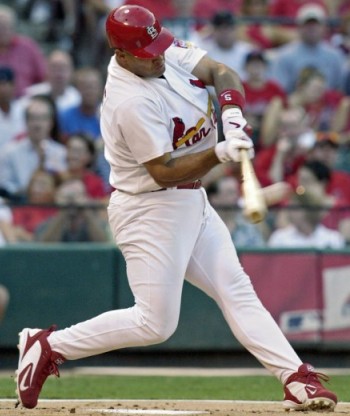
Albert Pujols at the Point Of Contact
At the POC, good hitters are usually anything but
extended, which is just one of many common Myths & Misconceptions about
hitting.
Myths & Misconceptions
As I discuss at length in my piece on
Hitting
Myths & Misconceptions, one reason why there aren't more great
hitters, and why people find hitting so hard, is because of the
large number of myths and misconceptions that exist about hitting,
including about topics like...
For instance, notice how, rather than hitting off of his
back foot and
squishing the bug,
the rapid rotation of Albert Pujols' hips have pulled him up onto
the point of his back foot.
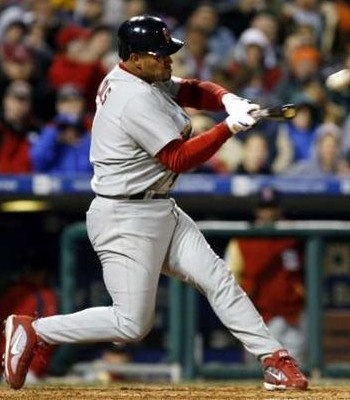
Albert Pujols Not Squishing the Bug
In fact, the rapid rotation of his hips sometimes pulls
Albert Pujols' back foot completely up in the air at the Point Of
Contact.
Phony Flaws
The problem with the various Myths & Misconceptions about hitting
is that they include a number of Phony Flaws; things that are
actually good and that contribute to the Efficiency of a swing...
...but are too often coached out of hitters and their swings.
Competing Approaches
Rotational Hitting, Linear Hitting,
and Extension Hitting are
different, and competing, approaches to teaching
hitting and to describing and developing a High Level Swing.
Of course, and as I discuss in my piece on
The Myth of the A
to C Swing and elsewhere in my
Hitting
essays, it is debatable whether Linear Hitting and Extension
Hitting describe the actual High Level Swing; whether what they
teach is what the best baseball and fast-pitch softball players
actually do. Similarly, and as I discuss in
Rotational
Hitting 101, there are problems with Mike Epstein's
understanding and explanation of the High Level Swing that
create problems with how he teaches Rotational Hitting.
As a result, when people ask me whether I teach Linear
Hitting or Rotational hitting, I say, "Neither. I teach the
High Level Swing." That doesn't mean that I won't draw on some
concepts and drills that could be classified as Rotational
Hitting or Linear Hitting, but the ultimate goal is always to get the student
closer to the High Level Swing.
Condition Your Core!
If you are going to dive into the High-Level Swing, then it's
important that you first make sure that your body is ready for the
transition. The High-Level Swing gets power from the muscles of the core (e.g. the Obliques) rather
than the arms. If you are going to keep from straining these
muscles, you must first make sure that they are properly
conditioned with a good core workout.
Do as he Does...
Albert Pujols recently had a conversation with Harold Reynolds
about hitting. What's interesting about this conversation is
that it's good
evidence
for the gap between the conscious, thinking mind and the
subconscious, doing mind. What Albert Pujols tells you NOT to do
is what he actually does in his swing and what he tells you TO do
isn't what he actually does. Instead, it's the same older
A to C garbage that most
major league instructors preach but that no good hitters actually
do.
To help people understand how Albert Pujols, and other major
leaguers, actually swing, I have put together a
number of free resources including a
Rotational
Hitting FAQ, an
analysis of a home run
swing of Albert Pujols, a discussion of
Albert Pujols'
stride, a page full of
photos of
Albert Pujols' swing, and a separate page that contains my
favorite examples
of swings.
About the Author
The ideas discussed in this and my related pieces on
Hitting...
...have helped transform the swings, approaches, and careers of multiple
major leagues hitters. With my help...
As Andres Torres said in 2012...
I know about training, but hitting was difficult.
And then in ’08... There’s a guy called Chris
O’Leary (a St. Louis fan who kept online
flipbooks
breaking down Pujols’ swing). He’s online. He talks
about Rotation. He's got
video
examples of Pujols, and I watched those.
-
Andres Torres 2012
Most recently, I helped reinvigorate the offense of
HSSU, an NAIA baseball team and HBC for whom I was the
Hitting Coordinator from February 2016 thru February 2017.
|
YEAR
|
AVG
|
SLG
|
OBP
|
|
2014
|
.298
|
.412
|
.369
|
|
2015
|
.263
|
.357
|
.350
|
|
2016
|
.311
|
.449
|
.400
|
|
2017
|
.334
|
.472
|
.420
|
|
2018
|
.286
|
.424
|
.387
|
|
2019
|
.276
|
.434
|
.354
|
While it pains me to see the guys at HSSU regress since I
left, I hope it makes it clear that I know what I'm talking about.
Become a Client
My clients have
access to my Streaming DVD and a number of other resources that
explain the High-Level Swing.
|


 The
Launch Angle Swing is the term that is used -- too often perjortatively -- to describe the swings
of the best baseball and fast-pitch softball players.
The
Launch Angle Swing is the term that is used -- too often perjortatively -- to describe the swings
of the best baseball and fast-pitch softball players.






